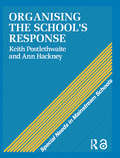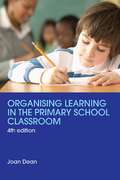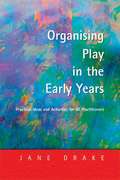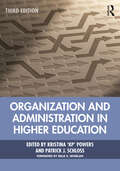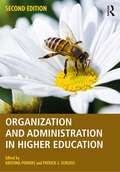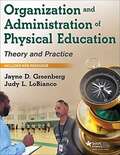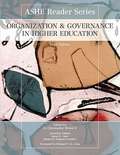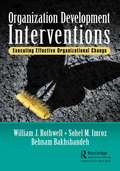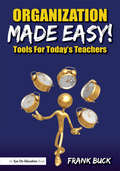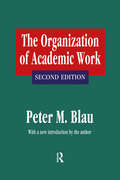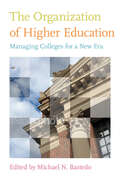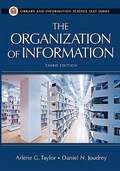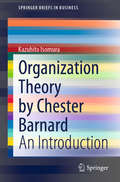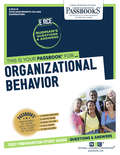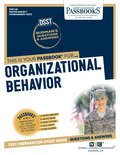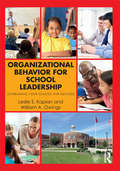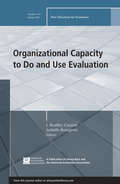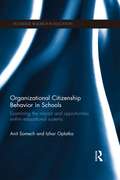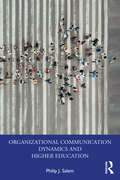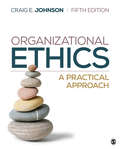- Table View
- List View
Organisationen und Netzwerke beraten lernen: Eine Analyse organisationspädagogischer Professionalisierung (Organisation und Pädagogik #34)
by Marc-André HeidelmannDie Arbeit setzt sich theoretisch, methodologisch und empirisch mit den Bedingungen und Möglichkeiten von Beratungslernen im Rahmen eines organisationspädagogischen, universitären Aus- und Weiterbildungsprogramms auseinander. Im Rahmen eines einjährig angelegten Fortbildungsprogramms wurden Studierende verschiedener Masterstudiengänge wissenschaftlich fundiert sowie problem- und erfahrungsorientiert darauf vorbereitet, regionale Vernetzungsprozesse für Kreislaufökonomien methodisch zu unterstützen und zu begleiten. Die qualitativ-längsschnittliche Erhebung sowie die metaphern- und diskursorientierte Analyse der sich vollziehenden Professionalisierungsprozesse der am Programm beteiligten Studierenden steht im Zentrum der Analyse. Mit der Untersuchung von Aneignungsmustern der Noviz*innen im Feld der organisationspädagogischen Organisations- und Netzwerkberatung bearbeitet der Autor das Desiderat längsschnittlicher Analysen von Professionalisierungsprozessen hochschulischer Beratungsausbildungen. Das Buch leistet nicht zuletzt auch grundlagenforschend einen Beitrag zur Entwicklung einer eigenen Begründung beziehungsweise eines möglichen Propriums organisationspädagogischer Organisations- und Netzwerkberatung und somit zur Fortentwicklung dieser jungen Subdisziplin insgesamt.
Organisationsentwicklung in der frühkindlichen Bildung
by Monika Zimmermann Tobias SanderEinrichtungen der frühkindlichen Bildung/Kindertagesbetreuung stehen zunehmend im öffentlichen Fokus. Der Ausbau gesetzlich garantierter Betreuungsplätze, ein Mangel an qualifizierten Mitarbeiter*innen sowie die zunehmende Vernetzung im Sozialraum stellen diese Form sozialer Dienste und ,Hilfen für Alle‘ vor, in Teilen betriebswirtschaftlich imprägnierte Herausforderungen, die – in Summe – kaum zu bewältigen scheinen. Wie gehen die (steuernden) Akteure - Träger, Einrichtungsleitungen und Teams - unter Berücksichtigung der spezifischen Organisationsformen und (professionellen) -kulturen in der Kindertagesbetreuung mit diesen Anforderungen um? Welche Rolle spielen Organisationsentwicklungsansätze wirtschaftswissenschaftlicher Provenienz? Inwieweit lassen sich zunehmend heterogene Teams, Betreuungs- und gleichzeitiger Bildungsauftrag sowie immer diverser werdende Stakeholder (Erziehungsberechtigte bzw. Familien, Grundschulen, Quartiersentwicklung) in Einklang bringen? Auf Basis empirischer Befunde sowie theoriebasierter Überlegungen werden im vorliegenden Band auch Handlungsbedarfe identifiziert und Strategien der Organisationsentwicklung auf ihre feldspezfische Belastbarkeit hin überprüft.
Organise Ideas: Thinking by Hand, Extending the Mind
by David Goodwin Oliver CaviglioliThe central purpose of this book is to help teachers organise ideas through the use of graphic organisers. Over 35 such word-diagrams are: organised into a system to help select the right tool for the job; described for rapid understanding of their strengths; and explained for step-by-step construction.Over 50 teachers each have a double-page spread in which they reveal how they use them in their teaching — across the full age range and span of subjects. A further section of the book demonstrates how to use these word-diagrams most effectively by partnering them with other teaching strategies, such as retrieval practice, writing, speaking and listening, teacher explanations, advance organisers, scaffolding, remote learning and more.The pages are illustrated to the same quality and quantity in Oliver’s previous book, Dual Coding with Teachers, its natural companion. A must-have textbook for every teacher that transcends contemporary ideological allegiances and fads.
Organising a School's Response (Special Needs in Mainstream Schools #1)
by Ann Hackney Keith PostlethwaiteFirst Published in 1988. Routledge is an imprint of Taylor & Francis, an informa company.
Organising Learning in the Primary School Classroom
by Joan DeanSince the publication of the first edition, Organising Learning in the Primary School Classroom has been recognised as an indispensable guide for primary school teachers in their quest for more effective practice in the classroom. It gives help on everyday problems of classroom organisation: how to group children, how to set out a classroom physically, how to make the most efficient use of time and resources. Now in its 4th edition, the book retains these strengths but has been brought right up to date with the many changes that are taking place nationally and globally. The book begins with a survey of these recent changes and goes on to consider their implications for teachers if today's schools are to prepare children for what is, to some extent, an unknown future. In addition to chapters on classroom organisation, the book includes chapters on: child development creativity PSHE and citizenship teaching language and literacy, ICT, mathematics and science the foundation subjects working with parents working effectively with Teaching Assistants evaluating and assessing learning teaching children with special educational needs or exceptional ability. Throughout, the aim is to get teachers and student teachers to analyse their own classrooms and to produce solutions that will work for them. This book will be invaluable not only to newly qualified teachers, but also to experienced practitioners wishing to review their work.
Organising Music
by Nic Beech Charlotte GilmoreOrganisational theorists have become increasingly interested in the creative industries, where practices that are commonplace are of particular interest to organisations in other sectors as they look for new ways to enhance performance. Focusing on the music industry, this book sets up a unique dialogue between leading organisational theorists and music professionals. Part I explores links between organisation theory and the creative industries literature, concentrating on practices of organising and knowledge mobilisation, followed by an in-depth discussion of key theoretical concepts by subject experts. Part II provides a diverse range of 'tales from the field', including examples from classical orchestras, folk, indie and punk. The concluding chapter examines the shared dialogue to reveal what practice in the musical field can learn from organisational theory, and vice versa. This innovative book will interest graduate students and researchers in the fields of organisation studies, music management and the creative industries.
Organising Play in the Early Years: Practical Ideas for Teachers and Assistants
by Jane DrakeFirst Published in 2004. Routledge is an imprint of Taylor & Francis, an informa company.
Organization and Administration in Higher Education
by Kristina ‘kp’ Powers Patrick J. SchlossSituating strategic planning and budgeting within the organization and administration of higher education institutions, this text provides effective and proven strategies for today’s change-oriented leaders. Bringing together distinguished administrators from two-year, four-year, public, and private colleges and universities, this volume provides both practical and effective guidance on the intricacies of the institutional structure, its functional activities, and contingency planning. Organization and Administration in Higher Education orients future administrators to the major areas of an academic institution and will assist higher education administrators in leading their institutions to excellence. New in the third edition is an expanded discussion of diversity, equity, and inclusion as well as updated coverage across various institutional settings including community colleges. Additionally, the authors provide guidance on managing crises and institutional disruptions such as those caused by the COVID-19 pandemic. Powers and Schloss offer refreshed end-of-chapter discussion prompts and online instructor materials, including PowerPoints to support multimodal learning and new methods of teaching found here: https://instituteforeffectiveness.org/organization-and-administration-of-higher-education
Organization and Administration in Higher Education
by Patrick J. Schloss Kristina PowersSituating strategic planning and budgeting within the organization and administration of higher education institutions, this text provides effective and proven strategies for today’s change-oriented leaders. Bringing together distinguished administrators from two-year, four-year, public, and private colleges and universities, this volume provides both practical and effective guidance on the intricacies of the institutional structure, its functional activities, and contingency planning. Organization and Administration in Higher Education orients future administrators to the major areas of an academic institution and will assist higher education administrators in leading their institutions to excellence. New in this Second Edition: New chapters on the impact of Title IX and social media on higher education. Updated coverage throughout on politics, technology, budgeting, program planning, and institutional changes. New end-of-chapter discussion prompts.
Organization And Administration Of Physical Education: Theory And Practice
by Jayne D. Greenberg Judy L. LoBiancoIf you want to know how to be the best, you learn from the best. Two SHAPE America Physical Education Administrators of the Year share what it takes to be an outstanding administrator in Organization and Administration of Physical Education: Theory and Practice. Jayne Greenberg and Judy LoBianco, veteran leaders in the field with decades of successful administration experience, head a sterling list of contributors who have taught at the elementary, middle school, high school, and college levels in urban, suburban, and rural settings. Together, these contributors expound on the roles and responsibilities of physical education administrators through both theoretical and practical lenses. The result is a book that will be highly useful to undergraduate students looking to enter the field, as well as a resource for administrators in physical education leadership positions who are looking to acquire new skills and innovative ideas in each of the five areas of responsibility covered in the book. Part I covers leadership, organization, and planning. It explores leadership and management styles and presents practical theories of motivation, development, and planning. It also looks at how to plan for the essential components of an effective, quality physical education program. In part II, readers examine various curriculum and instruction models and navigate through curriculum theory and mapping. This section also offers guidance on planning events, including special programs and fundraising projects, and how to build a team and secure community connections for those special events. Part III helps administrators plan and design new school sites or renovate existing ones, and it presents contemporary concepts in universal design and sustainable environmental design. It also offers ideas on how to incorporate technology to meet the needs of 21st-century learners, including the use of social media and robotics in delivering instruction and communication. Part IV explores written, verbal, and electronic communication issues, as well as legal and human resource issues. Administrators learn how to lobby and advocate for physical education, how the legal system affects schools, and how to examine personnel issues, bullying, and harassment. Part V explains the fiscal responsibilities inherent in administrative positions, including budgeting, bidding, and purchasing. It also shows how administrators can secure funding independent of district or local funding, offering many examples of grants and fundraising opportunities with sample grant applications. Throughout the text, special features—Advice From the Field and Leadership in Action—share tips, nuggets of wisdom, and examples of administrators excelling in their various responsibilities. The book also comes with many practical examples of forms that are useful in carrying out responsibilities, and each chapter offers objectives, a list of key concepts, and review questions to facilitate the learning. In addition, the text has related online resources consisting of supportive materials and documents. Organization and Administration of Physical Education: Theory and Practice, published with SHAPE America, offers the solid foundational theory that administrators need and shows how to put that theory into daily practice. Note: A code for accessing HKPropel is included with all print books.
Organization and Governance in Higher Education (Sixth Edition)
by M. Christopher Brown Jason E. Lane Eboni M. Zamani-GallaherOrganization and Governance in Higher Education is one of the primary teaching and research references in the study and practice of post secondary education. Research in higher education has provided new insights and recommendations for the management of postsecondary institutions. In addition to maintaining the strength and integrity of prior readers by continuing the coverage of classical theories and traditional models, the Fifth Edition provides updated reading to broaden the scope of the reader. New selections include current perspective on campus governance and institutional change. Because of the complex nature of the postsecondary institution, this reader creates eight subject area lenses. Each lens allows the reader to engage the specific paradigms and phenomena related to that aspect of higher education. The areas are arranged in the following order: classic organization theory, traditional administrative and governance models, campus climate and culture, leadership analysis, management principles, institutional change and assessment, perspectives on race and gender, and critical approaches to organizational governance. Features include: New sections on organization change, diversity, and postmodern critique Blends traditional "core" readings with numerous contemporary readings. Readings aid in understanding the multiple nuances of how colleges are organized, governed and administered Readings aid in understanding the multiple nuances of how colleges are organized, governed and administered Serves as a single-volume resource on higher education governance for both students and practitioners
Organization Development Interventions: Executing Effective Organizational Change
by William J. RothwellTo effectively adapt and thrive in today’s business world, organizations need to implement effective organizational development (OD) interventions to improve performance and effectiveness at the individual, group, and organizational levels. OD interventions involve people, trust, support, shared power, conflict resolution, and stakeholders’ participation, just to name a few. OD interventions usually have broader scope and can affect the whole organization. OD practitioners or change agents must have a solid understanding of different OD interventions to select the most appropriate one to fulfill the client’s needs. There is limited precise information or research about how to design OD interventions or how they can be expected to interact with organizational conditions to achieve specific results. This book offers OD practitioners and change agents a step-by-step approach to implementing OD interventions and includes example cases, practical tools, and guidelines for different OD interventions. It is noteworthy that roughly 65% of organizational change projects fail. One reason for the failure is that the changes are not effectively implemented, and this book focuses on how to successfully implement organizational changes. Designed for use by OD practitioners, management, and human resources professionals, this book provides readers with OD basic principles, practices, and skills by featuring illustrative case studies and useful tools. This book shows how OD professionals can actually get work done and what the step-by-step OD effort should be. This book looks at how to choose and implement a range of interventions at different levels. Unlike other books currently available on the market, this book goes beyond individual, group, and organizational levels of OD interventions, and addresses broader OD intervention efforts at industry and community levels, too. Essentially, this book provides a practical guide for OD interventions. Each chapter provides practical information about general OD interventions, supplies best practice examples and case studies, summarizes the results of best practices, provides at least one case scenario, and offers at least one relevant tool for practitioners.
Organization Made Easy!: Tools For Today's Teachers
by Frank BuckMeet the ever-growing organizational demands of today’s changing world with the variety of tools, digital and otherwise, available to you as a teacher. In this book, organization guru Frank Buck shows you how to take expert advantage of the specific electronic and paper-based resources that will help you manage your time and stay on course as a teacher of the 21st century. Buck offers practical, easy-to-read strategies for organizing your surroundings, increasing productivity, and reducing stress. Teachers will leave this book with a feeling of greater control of the day plus a renewed sense of pride in their profession.
The Organization of Academic Work
by Peter M. BlauThis book originated in an analysis of government bureaucracies. Peter Blau was led to wonder whether corresponding patterns are observable in the administrative structures of other types of organisations. This text examines the institutions of higher education, which Blau believes are the formal organisations that differ most in objectives and performance from government bureaucracies.
The Organization of Higher Education: Managing Colleges for a New Era
by Michael N. BastedoColleges and universities are best understood as networks of departments working together to fulfill a mission of education, innovation, and community partnership. To better understand how these large and complex institutions function, scholars can apply organizational and strategic planning concepts made familiar by business management. This book follows that model and explores the new and emerging ways by which organizational theories address major contemporary concerns in higher education. The contributors to this volume are both influenced and inspired by the pioneering work of Marvin Peterson and his four-decade career researching higher education organization. Comprising a serious reexamination of the field, the essays review past and current thinking, address the field’s core theoretical traditions, and pursue exciting new lines of inquiry, including the organizational dynamics of diversity and social movement organizations. Ideal for courses in administration and theory, this book reinvigorates the study of higher education as an organization and encourages scholars to rediscover the value of organizational principles in all areas of higher education research. Contributors: Michael N. Bastedo, University of Michigan; Patricia J. Gumport, Stanford University; James C. Hearn, University of Georgia; Adrianna Kezar, University of Southern California; Jason Lane, State University of New York at Albany; Simon Marginson, University of Melbourne; Michael K. McLendon, Vanderbilt University; Anna Neumann, Columbia University; Brian Pusser, University of Virginia; Fabio Rojas, Indiana University; Daryl G. Smith, Claremont Graduate University; William G. Tierney, University of Southern California; and the late J. Douglas Toma, University of Georgia
The Organization of Information (Third Edition)
by Arlene G. Taylor Daniel N. JoudreyThis third edition of Taylor's modern classic continues to articulate the theory, principles, standards, and tools behind information organization. As with previous editions, it begins with strong justification for the continued importance of organizing principles and practice. Following a broad overview of the concept and its role in human endeavors, Taylor and Joudrey provide a detailed and insightful discussion of such basic retrieval tools as inventories, bibliographies, catalogs, indexes, finding aids, registers, databases, major bibliographic utilities, and other organizing entities; and subsequently trace the development of the organization of recorded information in Western civilization from 2000 B.C.E. to the present. Standards of codification (MARC, SGML, and various DTDs), controlled vocabularies and ontologies, and Web 2.0 technologies are but a sample of its extensive topical coverage
Organization Theory by Chester Barnard: An Introduction (SpringerBriefs in Business)
by Kazuhito IsomuraThis book helps undergraduate and graduate students understand Chester Barnard’s organization theory. Barnard’s book The Functions of the Executive is a classic that, along with Herbert Simon’s Administrative Behavior, is often considered to be essential reading for management students. However, it is well known to be difficult and abstract. Offering a systematic overview, this book provides an excellent introduction to Barnard’s organization theory.Chester Barnard’s concept of formal organization is often cited as a definitive opus on the subject of organization. However, he provided other concepts of organization, such as cooperative systems, complex formal organizations, and informal organizations. In his second book, Organization and Management, he added two more concepts, lateral organizations and status systems, allowing researchers to gain a better understanding of how Barnard developed his organization theory after his first publication.Barnard was a successful practitioner as well as a theorist, and his organization theory is full of practical insights gained from managing various types of organizations, including NGOs and NPOs. This book discusses how Barnard’s organization theory can be applied to business practices in the context of exploring a new style of management, and provides suggestions for business people seeking innovations for their own organizations.
ORGANIZATIONAL BEHAVIOR: Passbooks Study Guide (Excelsior/Regents College Examination Series #Vol. Dantes-49)
by National Learning CorporationThe Excelsior/Regents College Examinations (E/RCE) offer you an opportunity to obtain recognition for college-level learning and consists of exams designed to demonstrate achievement and mastery of various college-level subjects, such as the Arts and Sciences, Business, Criminal Justice, Education, Health and Nursing. The E/RCE Organizational Behavior Passbook® prepares you by sharpening knowledge of the skills and concepts necessary to succeed on the upcoming exam and the college courses that follow. It provides a series of informational texts as well as hundreds of questions and answers in the areas that will likely be covered on your upcoming exam.
ORGANIZATIONAL BEHAVIOR: Passbooks Study Guide (DANTES Subject Standardized Tests (DSST) #Vol. Dantes-49)
by National Learning CorporationThe DSST Subject Standardized Tests are comprehensive college and graduate level examinations given by the Armed Forces, colleges and graduate schools. These exams enable students to earn college credit for what they have learned through self-study, on the job, or by other non-traditional means. The DSST Organizational Behavior Passbook® prepares candidates for the DSST exam, which enables schools to award credit for knowledge acquired outside the normal classroom environment. It provides informational text as well as hundreds of questions and answers in the areas that will likely be covered on your upcoming exam, including but not limited to: definitions and concepts; individual and group processes and characteristics; organizational structure; and more.
Organizational Behavior for School Leadership: Leveraging Your School for Success
by Leslie S. Kaplan William A. OwingsOrganizational Behavior for School Leadership provides a theoretical and practical framework to help emerging leaders build the mental models they need to be effective. Presenting traditional, modern, and contemporary perspectives, each chapter offers opportunities for readers to reflect on the ideas and apply their leadership perspective and skills to their own work settings. In this way, this important book helps graduate students in educational leadership understand organizational situations and circumstances, an essential step in making appropriate decisions about people, school operations, and the community that generate improved student and teacher outcomes. Special features include: Guiding questions—chapter openers to initiate student thinking. Case studies and companion rubrics—engage students in applying content to real-life school scenarios with guiding rubrics to help think through answers. Reflections and relevance—interactive learning activities, simulations, and graphic assignments deepen readers' understanding. PSEL Standards—each chapter aligns with the 2015 Professional Standards for Educational Leaders. Companion website—includes case studies and rubrics, supplementary materials, additional readings, and PowerPoint slides for instructors.
Organizational Capacity to Do and Use Evaluation: New Directions for Evaluation, Number 141 (J-B PE Single Issue (Program) Evaluation)
by J. Bradley Cousins Isabelle BourgeoisGain a greater understanding of organizational capacity to do and use evaluation and implications for evaluation capacity building (ECB). This volume is unique in that it represents a multiple case study of eight organizations that were committed to ECB. It: Situates the study in terms of ECB theory and research Delineates a conceptual framework Presents case profile reports and the results of a cross-case analysis. Discusses findings in terms of implications for research, theory, and practice. This is the 141st issue in the New Directions for Evaluation series from Jossey-Bass. It is an official publication of the American Evaluation Association.
Organizational Citizenship Behavior in Schools: Examining the impact and opportunities within educational systems (Routledge Research in Education)
by Anit Somech Izhar OplatkaThis book extends our understanding of the attitudes and behaviors of teachers who improve their schools consistently and considerably. It sets out to critically analyze and examine organizational citizenship behaviors (OCB) in schools from a contextual perspective and to display the uniqueness of the concept in the context of school, its dimensions, boundaries, antecedents and consequences from a multi-level perspective. Chapters consider: understandings of teachers' OCB, its nature, components, and salience in schools personal, organizational, and cultural factors which might facilitate or inhibit teachers' OCB contributions and the drawbacks of OCB for the improvement of educational systems, schools, and educators a new conceptualization of teachers' OCB based on the unique characteristics of school and the teaching profession, and consequences for theory and practice practical tools for guiding educational policy-makers, principals, and teacher educators on how to assimilate and enhance teachers' OCB. Organizational Citizenship Behavior in Schools will appeal to scholars and researchers in educational administration, educational policy, school leadership and teacher education. It will also be of interest to supervisors, policy makers and postgraduate students in the field of education.
Organizational Communication Dynamics and Higher Education
by Philip J. SalemThis book provides an analysis, a synthesis, and an application of over 50 years of organizational communication higher education research. What distinguishes one university from another is how members communicate with each other, and what distinguishes successful higher education organizations from others are their unique communication practices. Bringing important lessons and knowledge from the field of Communication Studies into Higher Education, this volume integrates research and theory to help improve organizational communication both across and outside the campus. Topics range from burnout and morale to student recruitment and organizational change. The volume addresses a current and pressing need at research universities, undergraduate programs, and community colleges and helps higher education scholars, researchers, and administrators confront organizational communication challenges.
Organizational Ethics: A Practical Approach
by Craig E. JohnsonWith an interdisciplinary focus, Organizational Ethics equips students with the knowledge and skills they need to make a positive impact in a variety of workplaces. Author Craig E. Johnson builds the text around interdependent levels of organizational behavior, examining ethics at the individual, group, and organizational levels. Self-assessments, reflection features, and application projects give students ample opportunity to practice their ethical reasoning abilities. The Fifth Edition includes over 25 new case studies on current events and prominent figures, 24 new self-assessments, and new discussions on topics such as cross-cultural ethical conflict and organizational virtue.
Organizational Ethics: A Practical Approach
by Craig E. JohnsonWith an interdisciplinary focus, Organizational Ethics equips students with the knowledge and skills they need to make a positive impact in a variety of workplaces. Author Craig E. Johnson builds the text around interdependent levels of organizational behavior, examining ethics at the individual, group, and organizational levels. Self-assessments, reflection features, and application projects give students ample opportunity to practice their ethical reasoning abilities. The Fifth Edition includes over 25 new case studies on current events and prominent figures, 24 new self-assessments, and new discussions on topics such as cross-cultural ethical conflict and organizational virtue.



